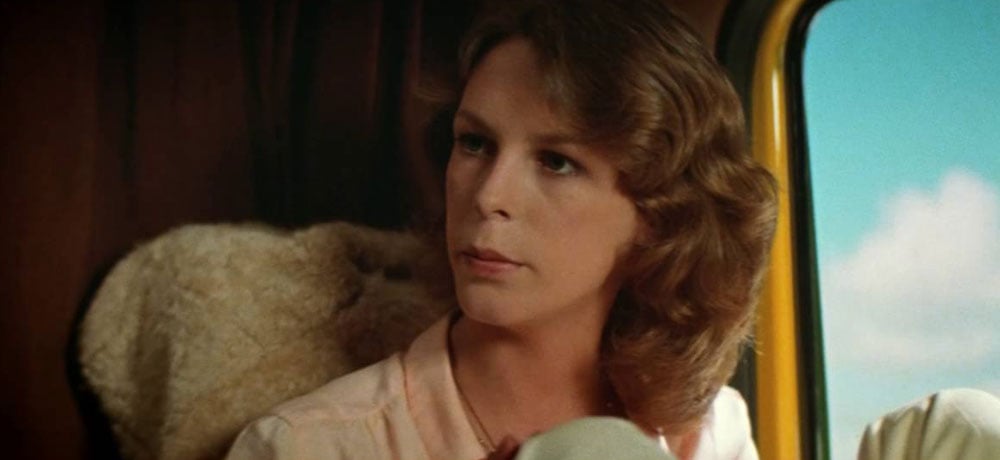


About midway through the pandemic in 2020, after watching more films at home in just six months than I would typically watch in 12 months, I was dealing with a significant case of cabin fever. So, I would go for long drives across the many local Arizona highways late in the evenings. My steering wheel soundtrack was mostly film scores from every single decade of film throughout history. Along my many drives, through busy city lights, and out on the lonely borders of the town, I would be reminded of my love for road trip films. When a giant semi-truck refused to pass me and instead followed closely on my bumper, I remembered Spielberg's DUEL. When a hitchhiker appeared out of nowhere, wearing an ankle-length black duster, I immediately thought of Rutger Hauer from The Hitcher. But the most memorable moment from these late-night cruises had to be pulling into a gas station right next to an older modeled green van with darkly tinted windows. I immediately thought of one movie, Road Games.
Australian film director Richard Franklin found success working in genre film in the late 1970s and early 1980s. The 1978 feature Patrick, about a comatose patient with telekinetic powers, was an award-winning international film. In 1983, Franklin had the unenviable task of reintroducing an aged Norman Bates freed after 22-years from psychiatric care in Psycho II. And in 1984, the director took horror to a remote seaside mansion where a scientist was doing experiments on an intelligent chimpanzee with dangerous repercussions.
While Franklin's films were consistently exciting and visually dynamic, it was the 1981 road tripper Road Games that showcased Franklin's assured skill behind the camera. This suspenseful thriller, which pays homage to Hitchcock's Rear Window, centers on a sleep-deprived truck driver traveling across Australia who begins to suspect that a serial killer is butchering female hitchhikers along the highway. That truck driver is named Pat Quid and is played by the always interesting Stacy Keach, who was coming off a big year in 1980 with Walter Hill's western The Long Riders and William Peter Blatty's asylum horror film The Ninth Configuration. Keach, whose character recites poetry to his pet dingo, is charming and confidently holds this entire Ozploitation thriller with a straightforward and sometimes silly performance.
Also along for the ride is horror veteran Jamie Lee Curtis. Already a megastar in the genre world, with Halloween, The Fog, Prom Night, and Terror Train in her catalog, Curtis builds playful and sassy chemistry with Keach as a hitchhiker named HITCH. While her screen time isn't relatively extensive, Curtis is excellent in every scene. You can sense how assured she is on camera in this film; confidence shines through whenever she is left to banter with a smart-mouthed trucker on screen.
While the performances are great, it's the methodically paced, Hitchcock-inspired narrative that drives Road Games into the conversation of best thriller films of the 1980s. The fact that this film could be made today, precisely as it was in 1981, and still retain all the dread and suspense is a massive compliment to the story written by Everett De Roche (Razorback and Patrick), but also the direction from Richard Franklin.
There are moments in Road Games that are simply beautiful in their composition. During an homage to Hitchcock, specifically, how the auteur organized suspense, Franklin builds a scene where Pat believes he sees the killer's shoes underneath a toilet stall door. However, at the exact moment, the hitchhiker he picked up is found climbing into the back of the suspicious green van Pat's been hunting the entire time. The dread and anxiety of the scene are palpable. During a stylized death sequence involving a hotel room, a beautiful woman, and piano string, one can't forget Franklin's apparent love for Italian cinema maestros, Argento and Fulci. It's pure cinema and utterly reminiscent of Giallo-style suspense.
In the middle of a global pandemic, where humanity retreated into the sanctuaries of their homes, Road Games feels ever more connected to the current times. Stacy Keach's overworked, essential services trucker lives a life of solitude, looking through the window of his semi-truck for a connection to the world. Building stories about what little in the world he can find to entertain his loneliness. Or how he talks to his furry companion, or a hitchhiking stranger, to maintain some connection to the outside world. While telling a tale of solitude and connecting the paranoia that grows from being alone, Road Games taps into the anxiety, loneliness, and fear that existed/exists throughout the Covid-19 predicament.
After all these years, Road Games still cruises confidently with its road trip vibes, suspenseful cat-and-mouse setups, and its gruesome undertones. The humor assists the film in developing chemistry between a wonderful Stacy Keach and a sublime Jamie Lee Curtis. At the same time, the seriousness of the thrills and chills situates the story securely in the pact of great horror thrillers from 1981.